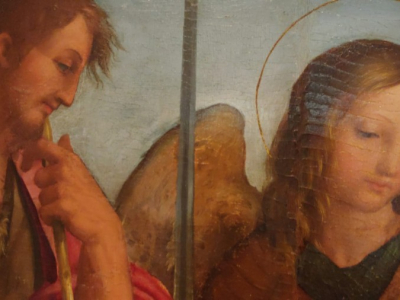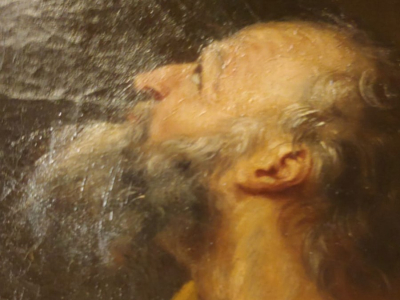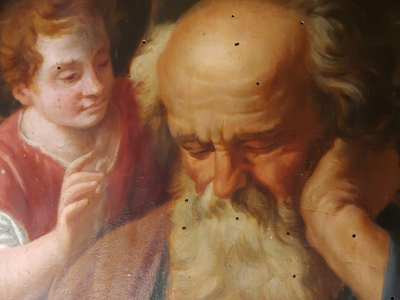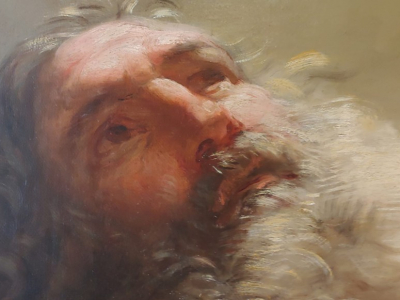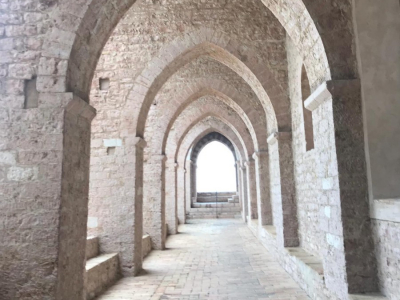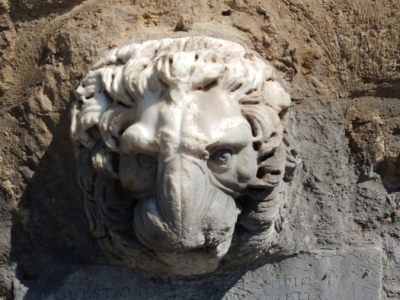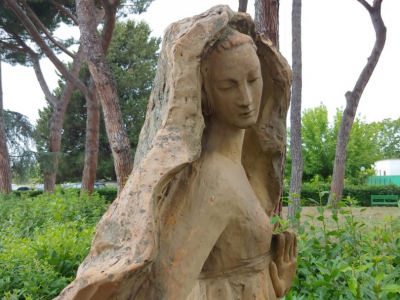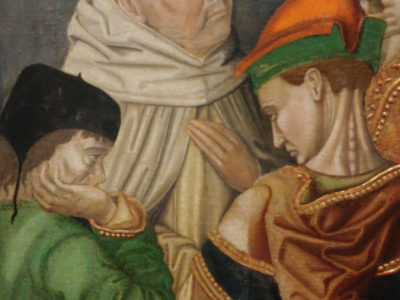stdClass Object
(
[id] => 16197
[title] => The infinite value of saying "no"
[alias] => the-infinite-value-of-saying-no
[introtext] => Prophecy is history / 15 - Those who obey the wrongful orders of the powerful share their guilt
by Luigino Bruni
Published in Avvenire 15/09/2019
« It wasn’t just one Ahab who was born, but, what is worse, an Ahab is born every day and in this world he never dies. Not only was Naboth killed. Every day Naboth is humiliated. Every day he is trampled upon »
Ambrogio, Naboth's vineyard
Nabot’s vineyard, one of the most terrible and well-known episodes of the Bible, is a tombstone asking us to stop and take care of this victim of those who believe themselves to be gods. In order to learn that not everything is negotiable.
In the Bible, and in great literature, every so often we encounter pages that have the same moral force as a tombstone. The stories of Uriah the Hittite, the daughter of Jephthah, Hagar, Dinah, Rizpah, Tamar, Job, Abel, the servant of YHWH, the crucified. We often skip them in search of more uplifting pages. Others show mercy instead. They stop, collect themselves, remember, pray, cry and care for them. The story of Naboth and his vineyard is one of these tombstone pages, a monument erected in the memory of an innocent victim. Naboth's vineyard is an ethical, social, economic and spiritual exercise that has generated moral feelings, laws and constitutions over the centuries. It taught us indignation, making us cry out "It's not fair!", "Ah, wicked, evil!", "There must be justice in this world", "Why, God? Where are you?", "Never again". It made man better, it made God better.
[fulltext] => «Some time later there was an incident involving a vineyard belonging to Naboth the Jezreelite. The vineyard was in Jezreel, close to the palace of Ahab king of Samaria. Ahab said to Naboth, “Let me have your vineyard to use for a vegetable garden, since it is close to my palace. In exchange I will give you a better vineyard or, if you prefer, I will pay you whatever it is worth”. But Naboth replied, “The Lord forbid that I should give you the inheritance of my ancestors”» (1 Kings 21,1-3). Ahab sees the land of Naboth, desires it and wants it in order to make a garden. So he talks to Naboth and offers him a contract. A seemingly fair and advantageous contract at the market price. Naboth however refuses, in the name of a value different from the economic one: that vineyard is the heritage of his ancestors. The Law of Moses had special legislation regarding land:
«The land must not be sold permanently, because the land is mine» (Leviticus 25,23). Land was not like any other commodity. If left or abandoned because of economic needs, it could be restored to the family by a relative (goel), and in the jubilee year returned to the old owner. Furthermore, land inherited from family was subjected to even greater constraints. Naboth respects the Lord and his Law and does not accept the offer. In addition, the king announces his desire to change the purpose of the land - he wants to dismantle the vineyard to plant a vegetable garden. In the Bible, a vineyard is not just any land. It is a prophetic symbol of the covenant (Isaiah), it is the image of the people of Israel. For these reasons and perhaps for others as well, Naboth does not accept the king's money. He does not sell and he does not give in. He decides that the land is not on the market. That good is inalienable to him, a non-negotiable value. By not selling, he is saying that his dignity is not for sale.
« So Ahab went home, sullen and angry because Naboth the Jezreelite had said, “I will not give you the inheritance of my ancestors.” He lay on his bed sulking and refused to eat.» (1 Kings 21,4). Faced with this refusal, King Ahab has an exaggerated reaction to say the least, entering a depressive state that resembles that of Elijah under the broom tree (1 Kings 19).
The Bible also knows of mistaken bouts of depression. Elijah’s crisis, generated by the persecution of Jezebel, caused two meetings with an angel and then the whisper on Mount Horeb. This depression of Ahab’s, originating from a legitimate refusal, does only go on to produce lies and death. Whoever, by duty or calling, finds himself helping people in crisis, must absolutely know how to distinguish between Elijah's kind of depression and Ahab's. They have a similar phenomenology, but the nature, reasons and consequences are completely different. If in place of his wife Ahab had had an honest adviser, he or she could have suggested that he should accept the reality of the refusal, work out his (small) mourning or disappointment and find another place for his garden. Unfortunately, however, for him (and for Naboth), next to Ahab we have his wife Jezebel, the shadiest figure in this story: «His wife Jezebel came in and asked him, “Why are you so sullen? Why won’t you eat?” He answered her, “Because I said to Naboth the Jezreelite, ‘Sell me your vineyard; or if you prefer, I will give you another vineyard in its place.’ But he said, ‘I will not give you my vineyard”. Jezebel his wife said, “Is this how you act as king over Israel? Get up and eat! Cheer up. I’ll get you the vineyard of Naboth the Jezreelite”» (1 Kings 21,5-7).
In these words spoken by the queen, we can see Herodias, Lady Macbeth, and other powerful women who, in those frequent inversions of roles, take the situation firmly in hand and quickly seek a solution for their weak husbands. A backwards Abigail, if you will, a female commander. Perhaps in an effort to save the honor of her husband, ("You govern like this over Israel?"), in the name of a very different conception of power from that desired by YHWH for his kings, Jezebel finds the worst way out. «So she wrote letters in Ahab’s name, placed his seal on them, and sent them to the elders and nobles who lived in Naboth’s city with him. In those letters she wrote: “Proclaim a day of fasting and seat Naboth in a prominent place among the people. But seat two scoundrels opposite him and have them bring charges that he has cursed both God and the king. Then take him out and stone him to death"» (1 Kings 21,8-10).
With one single act, she violates three commandments of the Law - do not kill, do not desire the belongings of others, do not bear false witness. A clear image of the worst face of power, never gone from this earth.
In these pages, the sin of David with Bathsheba comes right back to life again, and that of the two elders who tried to rape Susanna, and all the sins and crimes of the powerful who interpret their power as an elimination of the barrier that separates their part from the whole. The deepest and most terrible vice of power is to think that there is no such thing as an insurmountable limit, that everything becomes possible. The Bible has always fought this idea of power. Its controversy regarding monarchy is a systematic critique of this idea of power as omnipotent, which becomes immediately critical of idolatry, because every time a powerful person acts as omnipotent he or she is self-proclaiming themselves god. That is why Jezebel is an idolater, she has the prophets of YHWH killed, and she kills Naboth who had dared to put a limit on her and her husband's power.
With his no Naboth had told Ahab: you are not God. This is the truest struggle between every absolute power and God. Absolute powers fight religion because they want to be the only god. And they kill righteous prophets and men because they deny their divinity - in the New Testament Naboth lives again in John the Baptist, and both tell us that the real reason for their death is not ethical or economic but theological, because they oppose the omnipotence of the powerful who then proceed to kill them.
What is striking moreover in this story, is the complicity of the "elders and notables" of the city, silent when faced with the queen's letter, which explicitly contains both sins and crimes - «So the elders and nobles who lived in Naboth’s city did as Jezebel directed in the letters she had written to them» (1 Kings 21, 11). Those notables and elders, who until the moment before receiving the letter and then putting its recommendations into practice could have been perfectly good people (and perhaps they were), when they execute that order they immediately become accomplices and guilty, as guilty as Jezebel herself. How many times have we not seen it and continue to see it? By underlining this complicity, the Bible is telling us that those who obey the wrongful orders of the powerful share their sin. If it is true that those who help the prophets receive the same reward as the prophets themselves (like the widow with Elijah), it is equally true that those who help a powerful murderer share the same culpability.
The Bible is filled with many, splendid moments of saying yes: those of the prophets, that of Mary. Without these yes we would not have the story of salvation, we would not have callings, we would not have some of the most sublime things under the sun. But Naboth reminds us of the great value of saying no, and the negative value of saying yes when it should have been no. This story is turned dark by many perverse yeses and illuminated by just one right no. How many people save others and themselves because they have the strength to say no. They could say yes, the virtue of prudence and cost-benefit calculations would suggest to them that they should sell that field. They clearly see ninety-nine reasons to sell, and they find that one unwise reason to say no. Because that one reason is of another quality, it flies following another trajectory. It has another tone of voice within the soul. If the no of the many Naboths in history had not been said, if the no of the Naboths still present among us were were not being said today, the earth would be an unworthy place to live in. The no of the Naboths of the world are the yeast and the salt of the earth, without them, we would have only unleavened bread and tasteless food. Naboth was killed: «Then two scoundrels came and sat opposite him and brought charges against Naboth before the people, saying, “Naboth has cursed both God and the king.” So they took him outside the city and stoned him to death» (1 Kings 21,12-13). And here is now the tombstone.
While Ahab goes down to the vineyard to take possession of it, the prophet Elijah receives this word from God: « “Go down to meet Ahab king of Israel… He is now in Naboth’s vineyard, where he has gone to take possession of it. Say to him, ‘This is what the Lord says: Have you not murdered a man and seized his property?’ Then say to him, ‘This is what the Lord says: In the place where dogs licked up Naboth’s blood, dogs will lick up your blood—yes, yours!’"» (1 Kings 21,18-19).
This is the prophets as well: in a world where Naboth continues to be killed, where no one denounces the crimes because everyone is complicit and corrupt, they - Elijah or Nathan - by their calling, shout: "You have murdered". A wonderful mission. Naboth, however, is dead. Elijah’s word and the punishment that the Lord promises for Ahab, his wife and his lineage cannot resurrect Naboth. All that remains is his tombstone, which is still there for us, and continues to call to us.
Jeremiah, in one of his most beautiful pages, offers a great prophetic message by buying a field; here Naboth gives us another great message by refusing to sell a field. Even today, there are contracts that save people and there are non-contracts that save even more people. Our capitalism has succeeded for far too long in buying every desired vineyard in exchange for money. It never meets a Naboth who says no. And our planet is changing its destiny. We can still save ourselves, if we are able to make our time a time of Naboth. If we soon learn to say no to the new powerful, who today with their infinite wealth feel more omnipotent than ever. Because the whole earth is our inheritance: «Naboth replied to Ahab: "The Lord forbid that I should give you the inheritance of my ancestors”».
Download Article in pdf
[checked_out] => 0
[checked_out_time] => 0000-00-00 00:00:00
[catid] => 901
[created] => 2019-09-14 22:09:04
[created_by] => 64
[created_by_alias] => Luigino Bruni
[state] => 1
[modified] => 2020-08-23 18:41:02
[modified_by] => 609
[modified_by_name] => Super User
[publish_up] => 2019-09-22 09:09:04
[publish_down] => 0000-00-00 00:00:00
[images] => {"image_intro":"","float_intro":"","image_intro_alt":"","image_intro_caption":"","image_fulltext":"","float_fulltext":"","image_fulltext_alt":"","image_fulltext_caption":""}
[urls] => {"urla":false,"urlatext":"","targeta":"","urlb":false,"urlbtext":"","targetb":"","urlc":false,"urlctext":"","targetc":""}
[attribs] => {"article_layout":"","show_title":"","link_titles":"","show_tags":"","show_intro":"","info_block_position":"","info_block_show_title":"","show_category":"","link_category":"","show_parent_category":"","link_parent_category":"","show_associations":"","show_author":"","link_author":"","show_create_date":"","show_modify_date":"","show_publish_date":"","show_item_navigation":"","show_icons":"","show_print_icon":"","show_email_icon":"","show_vote":"","show_hits":"","show_noauth":"","urls_position":"","alternative_readmore":"","article_page_title":"","show_publishing_options":"","show_article_options":"","show_urls_images_backend":"","show_urls_images_frontend":"","helix_ultimate_image":"images\/2019\/09\/15\/Profezia_e_storia_15_ant.jpg","helix_ultimate_image_alt_txt":"","helix_ultimate_article_format":"standard","gallery":"","helix_ultimate_audio":"","helix_ultimate_video":"","link_title":"","link_url":"","quote_text":"","quote_author":"","post_status":""}
[metadata] => {"robots":"","author":"","rights":"","xreference":""}
[metakey] =>
[metadesc] =>
[access] => 1
[hits] => 2046
[xreference] =>
[featured] => 1
[language] => en-GB
[on_img_default] =>
[readmore] => 10977
[ordering] => 1
[category_title] => EN - Prophecy is history
[category_route] => commenti-biblici/serie-bibliche/it-profezia-e-storia
[category_access] => 1
[category_alias] => en-prophecy-is-history
[published] => 1
[parents_published] => 1
[lft] => 133
[author] => Luigino Bruni
[author_email] => ferrucci.anto@gmail.com
[parent_title] => IT - Serie bibliche
[parent_id] => 773
[parent_route] => commenti-biblici/serie-bibliche
[parent_alias] => serie-bibliche
[rating] => 0
[rating_count] => 0
[alternative_readmore] =>
[layout] =>
[params] => Joomla\Registry\Registry Object
(
[data:protected] => stdClass Object
(
[article_layout] => _:default
[show_title] => 1
[link_titles] => 1
[show_intro] => 1
[info_block_position] => 0
[info_block_show_title] => 1
[show_category] => 1
[link_category] => 1
[show_parent_category] => 1
[link_parent_category] => 1
[show_associations] => 0
[flags] => 1
[show_author] => 0
[link_author] => 0
[show_create_date] => 1
[show_modify_date] => 0
[show_publish_date] => 1
[show_item_navigation] => 1
[show_vote] => 0
[show_readmore] => 0
[show_readmore_title] => 0
[readmore_limit] => 100
[show_tags] => 1
[show_icons] => 1
[show_print_icon] => 1
[show_email_icon] => 1
[show_hits] => 0
[record_hits] => 1
[show_noauth] => 0
[urls_position] => 1
[captcha] =>
[show_publishing_options] => 1
[show_article_options] => 1
[save_history] => 1
[history_limit] => 10
[show_urls_images_frontend] => 0
[show_urls_images_backend] => 1
[targeta] => 0
[targetb] => 0
[targetc] => 0
[float_intro] => left
[float_fulltext] => left
[category_layout] => _:blog
[show_category_heading_title_text] => 0
[show_category_title] => 0
[show_description] => 0
[show_description_image] => 0
[maxLevel] => 0
[show_empty_categories] => 0
[show_no_articles] => 1
[show_subcat_desc] => 0
[show_cat_num_articles] => 0
[show_cat_tags] => 1
[show_base_description] => 1
[maxLevelcat] => -1
[show_empty_categories_cat] => 0
[show_subcat_desc_cat] => 0
[show_cat_num_articles_cat] => 0
[num_leading_articles] => 0
[num_intro_articles] => 14
[num_columns] => 2
[num_links] => 0
[multi_column_order] => 1
[show_subcategory_content] => -1
[show_pagination_limit] => 1
[filter_field] => hide
[show_headings] => 1
[list_show_date] => 0
[date_format] =>
[list_show_hits] => 1
[list_show_author] => 1
[list_show_votes] => 0
[list_show_ratings] => 0
[orderby_pri] => none
[orderby_sec] => rdate
[order_date] => published
[show_pagination] => 2
[show_pagination_results] => 1
[show_featured] => show
[show_feed_link] => 1
[feed_summary] => 0
[feed_show_readmore] => 0
[sef_advanced] => 1
[sef_ids] => 1
[custom_fields_enable] => 1
[show_page_heading] => 0
[layout_type] => blog
[menu_text] => 1
[menu_show] => 1
[secure] => 0
[helixultimatemenulayout] => {"width":600,"menualign":"right","megamenu":0,"showtitle":1,"faicon":"","customclass":"","dropdown":"right","badge":"","badge_position":"","badge_bg_color":"","badge_text_color":"","layout":[]}
[helixultimate_enable_page_title] => 1
[helixultimate_page_title_alt] => Profezia è storia
[helixultimate_page_subtitle] => Commenti Biblici
[helixultimate_page_title_heading] => h2
[page_title] => Prophecy is history
[page_description] =>
[page_rights] =>
[robots] =>
[access-view] => 1
)
[initialized:protected] => 1
[separator] => .
)
[displayDate] => 2019-09-14 22:09:04
[tags] => Joomla\CMS\Helper\TagsHelper Object
(
[tagsChanged:protected] =>
[replaceTags:protected] =>
[typeAlias] =>
[itemTags] => Array
(
)
)
[slug] => 16197:the-infinite-value-of-saying-no
[parent_slug] => 773:serie-bibliche
[catslug] => 901:en-prophecy-is-history
[event] => stdClass Object
(
[afterDisplayTitle] =>
[beforeDisplayContent] =>
[afterDisplayContent] =>
)
[text] => Prophecy is history / 15 - Those who obey the wrongful orders of the powerful share their guilt
by Luigino Bruni
Published in Avvenire 15/09/2019
« It wasn’t just one Ahab who was born, but, what is worse, an Ahab is born every day and in this world he never dies. Not only was Naboth killed. Every day Naboth is humiliated. Every day he is trampled upon »
Ambrogio, Naboth's vineyard
Nabot’s vineyard, one of the most terrible and well-known episodes of the Bible, is a tombstone asking us to stop and take care of this victim of those who believe themselves to be gods. In order to learn that not everything is negotiable.
In the Bible, and in great literature, every so often we encounter pages that have the same moral force as a tombstone. The stories of Uriah the Hittite, the daughter of Jephthah, Hagar, Dinah, Rizpah, Tamar, Job, Abel, the servant of YHWH, the crucified. We often skip them in search of more uplifting pages. Others show mercy instead. They stop, collect themselves, remember, pray, cry and care for them. The story of Naboth and his vineyard is one of these tombstone pages, a monument erected in the memory of an innocent victim. Naboth's vineyard is an ethical, social, economic and spiritual exercise that has generated moral feelings, laws and constitutions over the centuries. It taught us indignation, making us cry out "It's not fair!", "Ah, wicked, evil!", "There must be justice in this world", "Why, God? Where are you?", "Never again". It made man better, it made God better.
[jcfields] => Array
(
)
[type] => intro
[oddeven] => item-odd
)







